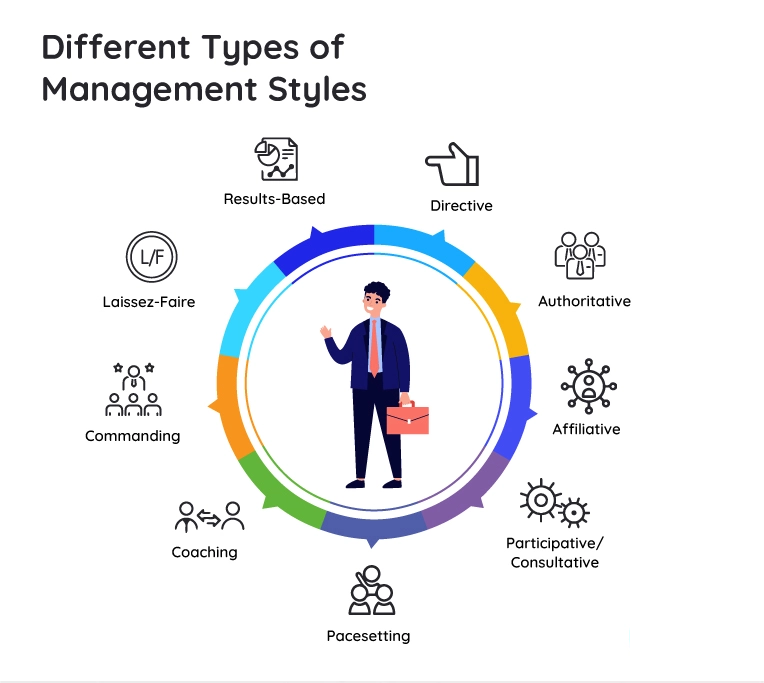Effective management goes beyond simply telling others what to do. It requires an array of management techniques tailored to different situations, team dynamics, and individual personality types.
Styles such as autocratic, persuasive, paternalistic, and democratic management have unique aspects that can be used depending on the team’s communication preferences and self-management skills.
Other approaches like transformational, laissez-faire, visionary, consultative, and delegative management offer diverse leadership styles. These may be particularly beneficial in differentiating team-building activities and fostering a conducive work environment.
Understanding and implementing these styles of management enhances overall performance.
Introduction to management styles
Management styles are diverse and driven by an array of factors such as communication preferences, personality types, and team-building activities. They define how decisions are made, responsibilities are distributed, and teams are guided. These styles encompass a wide range including autocratic, democratic, laissez-faire, and many more.

Some leaders may adopt a single management style, while others alternate between a variety depending on the circumstances. There are various management techniques and self-management skills utilized to enhance their leadership styles.
For instance, visionary management inspires innovation, consultative management encourages feedback, and delegative management promotes autonomy.
Defining management styles
Management styles are categorized by different management techniques which interpret the strategy used by different leaders in managing their teams. They are largely influenced by self-management skills, personality types, and communication preferences of the manager. Some well-known styles include democratic management, autocratic management, and transformational management.
Democratic management involves team-building activities, enabling employees to be a part of decision-making. Autocratic management is more directive, with decisions made by the manager alone while transformational management stimulates and inspires team members to transcend their own personal goals for the good of the organization.
The importance of management styles in an organization
Effective management styles play a crucial role in shaping an organization’s success. Styles such as autocratic management, democratic management, and transformational management can significantly impact productivity levels, employee morale, and overall performance. Understanding these management techniques helps cultivate self-management skills and promotes effective team-building activities.
Leadership styles should align with the team’s personality types and communication preferences. For example, a consultative management style might work best in a team of independent thinkers, while a paternalistic management style may be more effective in a different setting. The importance of flexible leadership can’t be understated in achieving organizational goals.
Overview of different management styles
Management styles are like the colors of a palette, influenced by personality types and communication preferences, offering a spectrum that includes autocratic, persuasive, paternalistic, democratic, consultative, transformational, laissez-faire, visionary, and delegative techniques. Autocratic bosses call the shots solo, while persuasive managers also go it alone but break down their reasoning to the team. Paternalistic leaders, kin to autocratic, decide what’s best for the crew.
Democratic and consultative bosses toss the ball into the team’s court for decisions, with democratic leaders letting the team call the final shots. Meanwhile, transformational, visionary, and laissez-faire leaders light the fire of self-management in their teams. Delegative leaders take a step back, giving their people the reins.
Autocratic management style
In the world of management, autocratic style stands tall with total control. It's all about top-down decisions with little to no input from the team, ideal for managers cut from the old-school cloth.
This fast-track style can get things done quickly but isn't the best at fostering team spirit or self-drive. It's a fit for those who march well under strict orders.
Democratic management style
Democratic management is all about group vibes, inviting everyone to weigh in. This style thrives on mixing up personalities and valuing every voice, aiming to craft a collective path forward.
Unlike its autocratic or persuasive cousins, democratic management boosts the team’s autonomy and morale, making the workplace a win-win arena.
Laissez-faire management style
Laissez-faire is the chill leader of the pack, handing over the keys to the team to drive their tasks with minimal oversight. It's a hit in creative and skilled teams, nurturing innovation and critical thinking.
This style lets team members define their way of communicating, fitting snugly with various personality types and enhancing trust and independence within the squad.
Transactional management style
Transactional management plays by the book, focusing on clear rules and rewards (or penalties). It shares a border with autocratic style, keeping the reins tight on decision-making.
This method is big on discipline and fine details, expecting tasks to be ticked off efficiently and often using team activities to tighten the group’s dynamics. It suits those who thrive under structured guidance.
Transformational management style
Transformational management is the cheerleader, inspiring teams by spotlighting individual strengths and knitting strong ties. This style is about uplifting and transforming the workplace, encouraging folks to surpass their own benchmarks and bring fresh ideas to the table.
Leaders here are adept at tuning into various personality types and sparking collective enthusiasm through team activities.
Choosing the right management style
Different management styles can have varying impact on the success of a project. A clear understanding of project management processes can help managers to make more informed decisions. Therefore, integrating these processes into your management style may contribute to higher efficiency and productivity.

Picking the right style is like matching the key to the lock, considering communication habits, self-drive, and the team's chemistry. The choice between autocratic, persuasive, paternalistic, or delegative styles and others like democratic, consultative, transformational, and laissez-faire hinges on what will jive best with your team’s vibe and the overall mission of your organization.
Understanding your team
Getting the best from your team means really getting them—knowing their personalities, how they talk shop, and their level of initiative. This insight helps tailor activities and manage effectively, choosing from styles like autocratic, democratic, or transformational to boost performance and growth.
Assessing the organizational culture
Grasping your organization's culture is key to picking management styles that will resonate. Whether it’s autocratic, paternalistic, democratic, or laissez-faire, each style plays into how communication flows, how independently team members operate, and how they mesh personalities, all of which steer the ship of team activities towards a productive climate.
Considering the nature of the task
Delving into management techniques means looking at personality mixes, communication styles, and various management approaches like autocratic, democratic, and laissez-faire. These elements shape leadership decisions within a team or organization, revealing how to blend management methods, pick suitable styles, and kick off team activities for top-notch self-management and collective productivity.
Effective usage of different management styles
Effective leadership requires mastering a variety of management styles. These can range from autocratic management, where the leader makes all the decisions, to democratic management, which involves team decision-making. Knowledge of different personality types and their communication preferences can enhance management techniques and foster better relations with team members.
Self-management skills, including time management and emotional intelligence, are critical to being a productive leader. Engaging in team-building activities can boost group cohesion and performance. Moreover, styles like transformational management emphasize shaping and inspiring employees towards the leader’s vision, while laissez-faire management encourages independence.
When to use autocratic management style
The autocratic management style is best employed under specific scenarios. This technique may be effective when the team lacks self-management skills and needs constant supervision. It’s also appropriate during crises when quick decisions must be taken, without the rigors of democratic management processes.
Autocratic management suits some personality types better than others too. Those who prefer clearly defined roles and direct instructions often thrive in such an environment. Lastly, this management technique can sometimes be necessary for team-building activities, in order to ensure all team members cooperate and fulfill their responsibilities.
When to use democratic management style
The democratic management style is deemed suitable when team members have the required self-management skills and are experienced in their roles. This style fosters team-building activities and open communication preferences, encouraging decision-making at all levels and a broader understanding of the organization’s goals.
It’s also advantageous when dealing with a diverse team with varying personality types as it encourages participation and inclusiveness. However, this style is not recommended in crises or rushed situations when autocratic management might drive faster decision-making.
When to use laissez-faire management style
The laissez-faire management style is best used when a team is highly experienced and skilled with solid self-management skills. This hands-off approach facilitates innovation and creativity, as it affords team members a high level of autonomy. Using this style, employees are able to develop and implement their own management techniques without constant supervision.
Additionally, it leads the way for team-building activities, offering opportunities for employees to foster stronger working relationships. Interestingly, certain personality types may flourish under this style, particularly those who are intrinsically motivated and enjoy freedom within their roles.
Conversely, it may not be suitable for teams that prefer other leadership styles, such as autocratic, persuasive, or paternalistic management.
When to use transactional management style
Transactional management style should be used when the focus is primarily on maintaining routine operations and enhancing productivity. It suits scenarios where work procedures are clearly established and a rewards and punishments system is deemed effective.
It is particularly useful in autocratic management, where there’s a clear top-down communication preference, and work scenarios that don’t necessarily require innovation or creative inputs.
Moreover, in team-building activities where certain personality types value clear structures and direct leadership styles, this method can be beneficial. In terms of self-management skills, the transactional management style encourages individuals to meet precise objectives to receive rewards.
When to use transformational management style
The transformational management style is ideally suited when an organization requires drastic changes to boost its performance or direction. This leadership style primarily involves implementing new management techniques and redefining communication preferences. It also involves the introduction of innovative self-management skills and team-building activities.
Transformational leadership is most effective in contexts where a team needs to be motivated towards a new or shared vision. A transformational leader recognizes the diversity of personality types on their team and fosters an environment conducive to growth and innovation.
Impact of management styles on employee performance

The sway of management styles over employee performance is profound. Techniques like transformational management ramp up self-management among employees, pushing productivity higher.
Leadership approaches like democratic management open the floodgates for communication, sparking creativity and innovative thought. Meanwhile, consultative management’s focus on team-building activities solidifies group dynamics and boosts performance overall.
Plus, the mix of different personality types under these management umbrellas can significantly shape employee outcomes.
How management styles affect employee motivation
Management styles are big players in driving employee motivation.
For example, transformational and visionary management styles dial up engagement by promoting self-management skills and a shared vision. On the flip side, autocratic management might throw cold water on motivation, as it offers little room for employee input.
Personality types and communication preferences also weigh heavily on how employees vibe with different management approaches. Some might blossom under a delegative style, while others might prefer a more structured environment. Team-building activities can further stoke motivation by cultivating a supportive work culture and encouraging teamwork.
Management styles and employee productivity
The impact of management styles like autocratic, democratic, and laissez-faire on employee productivity can't be overstated. Autocratic management might stifle creativity, whereas democratic and laissez-faire styles could be catalysts for innovation. The blend of communication styles and personalities also tailors the effectiveness of management techniques.
Leveraging self-management skills strikes a balance between autonomy and guidance, refining the effectiveness of team-building activities. Moreover, leadership styles like transformational or visionary management can propel productivity and deepen commitment among employees.
Conclusion: Adapting your management style
Tweaking your management style requires a deep dive into understanding individual personality types, communication preferences, and deploying impactful team-building activities. Integrating a spectrum of management techniques—from autocratic and persuasive to consultative and transformational—can elevate self-management skills across your team.
Successful adaptation often means blending various leadership styles, including visionary and delegative management, to meet the diverse needs of your team effectively. This tailored approach can significantly enhance both individual and group performance, driving your team towards greater achievements.







